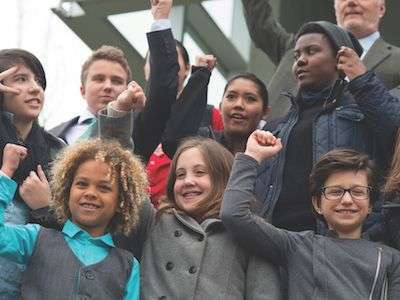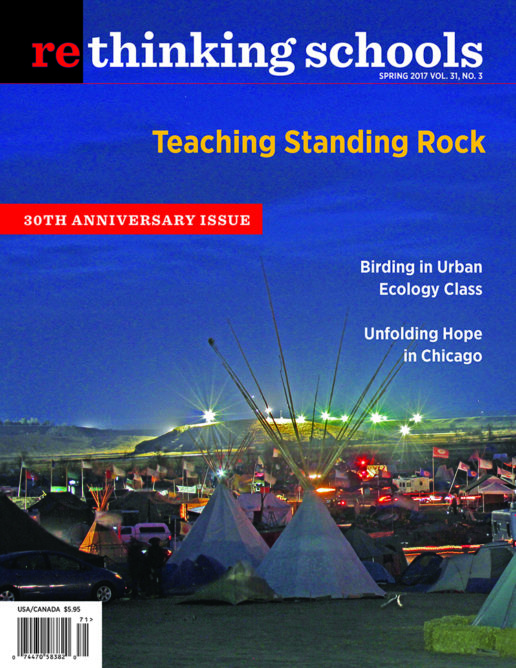Kids Sue for Right to a Better Climate // Teachers Take on Trump Era
Illustrator: Photo via Andrea Willingham/Our Children's Trust

Photo via Andrea Willingham/Our Children’s Trust
Two days after the election, 21 plaintiffs, aged 9 to 20, won a critical court ruling on the constitutional obligation of the U.S. government to protect our children’s right to a livable Earth. Juliana v. United States alleges that the government has violated those rights by “directly causing atmospheric CO2 to rise to levels that dangerously interfere with a stable climate system” and knowingly endangered their health and welfare.
The Fifth Amendment to the U.S. Constitution bars the federal government from depriving a person of “life, liberty, or property” without due process of law. The suit says that the government’s refusal to avert climate disaster is a violation of the Fifth Amendment. It also states the government has violated its duty to protect the public trust by allowing the depletion and destruction of the atmosphere.
As 13-year-old plaintiff Jayden Foytlin from Rayne, Louisiana, explains: “Our government seems to care more about money for the fossil fuel industry than our futures. But money isn’t going to matter if we can’t fix our planet.”
The Obama Department of Justice admitted three key sets of facts: Government officials have been aware of scientific research on the effects of fossil fuel emissions on the atmosphere for more than 50 years; federal defendants “permit, authorize, and subsidize fossil fuel extraction, development, and exportation”; and “current and projected concentrations of six well-mixed greenhouse gases in the atmosphere, including CO2, threaten the public health and welfare of current and future generations.” The government lawyers then argued that the climate kids didn’t have the legal standing to sue. Climate change, they said, should be left to other branches of government.
But U.S. District Court Judge Ann Aiken of the federal district court in Oregon ruled that the suit could go forward. She said: “I have no doubt that the right to a climate system capable of sustaining human life is fundamental to a free and ordered society. . . . To hold otherwise would be to say that the Constitution affords no protection against a government’s knowing decision to poison the air its citizens breathe or the water its citizens drink.”
Julia Olson, the lead counsel for the plaintiffs and executive director of Our Children’s Trust, the Oregon-based nonprofit that helped bring the lawsuit, called the decision “one of the most significant in our nation’s history.”
“This is going to be the trial of our lifetimes,” agreed 16-year-old plaintiff Xiuhtezcatl Martinez, from Boulder, Colorado, who testified that increased wildfires and extreme flooding are putting him at risk. “The actions those in power take and the decisions they make will determine the kind of world future generations will inherit.”
Now the government’s case will be handled by Trump’s Department of Justice under Jeff Sessions, which has indicated it is going to stall. And the case is likely to be appealed all the way to the Supreme Court. But, as Jeremy Brecher argued in a recent article in Common Dreams, “Long before the trial, the case will provide a golden ‘teachable movement’ for a full-scale educational campaign and debate on Trump’s commitment to climate destruction.” And, “if the courts won’t enforce that right, it is up to the people to do so.”
Based on reporting by Jeremy Brecher (“Trial of the Century Pits Trump Climate Denialism Against Right to a Climate System Capable of Sustaining Human Life,” Common Dreams, Feb. 24, 2017) and Eric Holthaus (“The Kids Suing the Government Over Climate Change Are Our Best Hope Now,” Slate, Nov. 14, 2016).
Teachers Take on Trump Era
Teachers throughout the United States are struggling to recover from the shock of the election and beginning to organize to protect their students and their schools. In New York City, for example, protests have been taking place on a near daily basis since the inauguration.
According to Rethinking Schools editor Adam Sanchez: “Trump’s election has politicized our school. Harvest Collegiate was always a progressive high school, but now there are daily conversations about Trump’s attacks and what we can do to organize against them. These conversations are happening not just in the classroom, but in after-school clubs, in the hallways, in the breakroom. The student walkouts — after the inauguration, when Betsy DeVos was confirmed as secretary of education, in protest of the Muslim travel ban — led to special teacher meetings because we felt we weren’t doing enough for the movement. Our students were challenging us to do more.”
National and local teacher unions, progressive caucuses, and grassroots education organizations mobilized in opposition to DeVos’ confirmation hearings. Badass Teachers Association’s call for teachers to wear black the week leading up to the vote went viral. Teachers, students, and parents called, faxed, and emailed their congresspeople, forcing Vice President Pence to break the tie over her confirmation.
Teachers are working to protect their most vulnerable students, promote critical conversations, develop relevant curriculum, and support student activism. And they’re joining together to figure out how to do that. The Critical Educators Collective in Portland, Oregon, held a “Teaching in a Time of Trump” gathering Feb. 11. More than 400 educators from the Northwest responded to the organizers’ call: “Do you teach for social justice? Worried about the harm and threat the Trump administration poses to our students and their families? Scared that our own ability to teach for social justice is under attack? We’re stronger together. Join us for strength, community, and resources.”
Llondyn Elliott, a 2015 Grant High School graduate, a transgender Black man, was one of the panelists. He told educators, “The most powerful thing that you can give me . . . is critical thinking.” Panelists also included RS editor and Roosevelt High School teacher Moé Yonamine, who told participants: “This is not a time to be neutral.”
Rethinking Schools cosponsored “Sanctuary Education: A Conference for K-12 Teachers, Staff, and Youth Workers on Meeting the Needs of Arab and Muslim Youth in the Trump Era” on Feb. 18 in Oakland, California. RS joined forces with the Arab Resource and Organizing Center, the Middle East Children’s Alliance, Teachers 4 Social Justice, and the Alliance of South Asians Taking Action.
The conference started with a panel of Arab and Muslim youth who talked about their experiences in school, the impact of feeling isolated and under attack, and what they need from teachers and schools:
“We need teachers, counselors, and administrators who look like us, who speak our languages and know our cultures.”
“We need to see our history and our reality in the curriculum.”
“We need you to put your bodies on the line.”
Then participants attended workshops: “Know Your Rights”; “Talking with Students About Racism, Sexism, Islamophobia, and Xenophobia” at different grade levels; and age-appropriate curriculum from K-12. The conference ended with a conversation on “Making Sanctuary Real in Schools and Communities” and a promise of more events soon.

